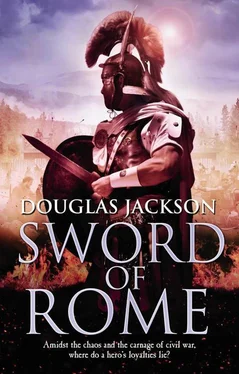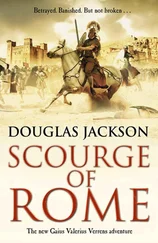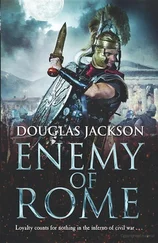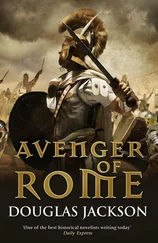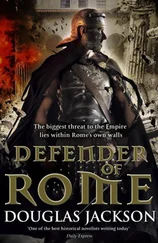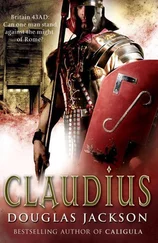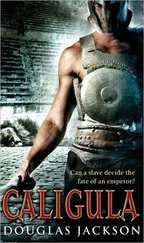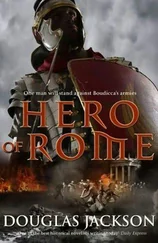Douglas Jackson - Sword of Rome
Здесь есть возможность читать онлайн «Douglas Jackson - Sword of Rome» весь текст электронной книги совершенно бесплатно (целиком полную версию без сокращений). В некоторых случаях можно слушать аудио, скачать через торрент в формате fb2 и присутствует краткое содержание. Жанр: Исторические приключения, на английском языке. Описание произведения, (предисловие) а так же отзывы посетителей доступны на портале библиотеки ЛибКат.
- Название:Sword of Rome
- Автор:
- Жанр:
- Год:неизвестен
- ISBN:нет данных
- Рейтинг книги:5 / 5. Голосов: 1
-
Избранное:Добавить в избранное
- Отзывы:
-
Ваша оценка:
- 100
- 1
- 2
- 3
- 4
- 5
Sword of Rome: краткое содержание, описание и аннотация
Предлагаем к чтению аннотацию, описание, краткое содержание или предисловие (зависит от того, что написал сам автор книги «Sword of Rome»). Если вы не нашли необходимую информацию о книге — напишите в комментариях, мы постараемся отыскать её.
Sword of Rome — читать онлайн бесплатно полную книгу (весь текст) целиком
Ниже представлен текст книги, разбитый по страницам. Система сохранения места последней прочитанной страницы, позволяет с удобством читать онлайн бесплатно книгу «Sword of Rome», без необходимости каждый раз заново искать на чём Вы остановились. Поставьте закладку, и сможете в любой момент перейти на страницу, на которой закончили чтение.
Интервал:
Закладка:
‘Come for me.’
XLV
Marcus Salvius Otho Augustus delayed his departure long enough to make a rousing speech which extolled honour, duty and courage and his right to rule as directed by the Senate and people of Rome. It was a fine speech, with Otho at his charming, persuasive best, and its message was that they could not lose. The legions cheered him to the heavens.
But later, as they watched the Emperor ride away with an escort of six cohorts of elite Praetorian Guards, Valerius felt the mood change. There were no cries or protests, but he could see the looks of puzzlement and disappointment in the faces of Juva and the First Adiutrix, and Marcus and his gladiators. For the first time he realized the true magnitude of Otho’s misjudgement.
‘They think he’s deserting them,’ Serpentius voiced the unspoken thought.
Celsus had claimed no Emperor since Augustus had fought beside his legions. But those legions had not been fighting a civil war, they had been fighting for the expansion of the Empire against barbarians. In the coming days, Otho’s legions would meet fellow Roman citizens in battle, and would be fighting not for the Empire, but for a man. Now that man was riding to safety, leaving them to serve under leaders in whom they had little or no trust, and, worse, he was taking with him three thousand men who should have been fighting at their side.
Valerius was reminded of that moment during a conference of senior officers two days later beside the Via Postumia. They had covered barely twelve miles on the first day, delayed by confusion in the baggage train. Today they had marched until the sixth hour across the flat, featureless landscape on a raised causeway barely wide enough to take eight men, bounded by ditches that would hamper the legions’ ability to deploy into battle order. Paulinus wanted to leave the road and make camp for the night, arguing there was no point in going any further before nightfall. ‘We can set up a defensive position here and be on the outskirts of Cremona tomorrow with a full twelve hours of daylight ahead. There is ample water and the ground is soft enough to dig.’
‘We should continue.’ Licinius Proculus, the Praetorian prefect, had accompanied Otho’s brother Titianus from Rome and shared his authority. ‘We can march another four or five miles before we have to make camp. Perhaps age wearies you, consul?’ The words were accompanied by a smile but his voice was heavy with sarcasm. ‘I’m sure we can find you a carriage.’
Paulinus had commanded great armies and fought more battles than he could count. The insult made no more than a scuff on his armour. ‘You are right, Proculus, I am getting old, but I am perfectly capable of riding another five miles. And age means I need not defer to a man whose closest acquaintance with the blood and guts of battle has been breaking plebeian heads in the Forum during a bread riot.’ The barb was accompanied by a vicious, shark-toothed smile. ‘If we meet the enemy on the march, he will have travelled four miles and be as fresh as the moment he broke fast. We will have marched thirty in two days and even you must have noted the shambles behind us.’ He gestured back along the road, where auxiliaries mixed haphazardly with legionaries, and pack mules and baggage carts had forced great gaps between cohorts and centuries. ‘Only a fool would put himself in a position where his foes could bring him to battle with two hours to darkness. You have fought a night action, perhaps, Proculus, in your bed at the Castra Praetoria?’
Benignus, who had ridden at Valerius’s side all day, nodded quietly in agreement. Aquila, the Thirteenth’s commander, had bristled at the suggestion of lack of organization in the column, but he gave his support to Paulinus. ‘And we should send our scouts further ahead. If we meet Vitellius’s forces on the march they will smash the column before we can deploy. You have seen the ground to the north: a nightmare of bushes, vines and ditches. We must have time to clear a line of fire or they will be on us before we know it.’
‘Or we among them,’ Titianus suggested tartly, ‘if we show more offensive spirit than has been hitherto displayed. My brother’s orders were to press the enemy.’
‘Your brother is not here,’ Paulinus snapped.
They were still arguing when an exhausted Imperial messenger rode up, instantly identifiable by the yellow cape that warned no man to delay him. He looked from one officer to the other, seeking a leader and evidently not finding one. There was an odd moment of comedy while Paulinus and Celsus jostled for position with Proculus and Titianus before Titianus accepted the dispatch. He broke the seal and opened the cylindrical leather pouch. Proculus stood at his shoulder frowning as he read the contents.
‘My brother chides us for our lack of progress.’ His tight smile said the wording was more forthright. ‘He demands to know why we have not brought the enemy to battle.’
Paulinus sniffed. ‘Very well, we will continue, but I ask that my protest be noted in case of disaster. And Aquila is right: those idle cavalrymen must probe another five miles further ahead.’
There was no disaster, just another few weary miles and a camp site with little water on stony ground that defeated even the strongest mattocks. The following day began like any other with its dawn chorus of coughs and farts, the soft murmur of thousands of men lost in the low mist.
Valerius was preparing for another long day in the saddle when Marcus, the lanista who was now a centurion, approached apologetically.
‘We lost another twenty in the night,’ he said, confirming what Valerius had feared. A few men had deserted before the march began, and more on the first night. ‘They’re not soldiers,’ Marcus explained. ‘They expected a quick campaign, a little bit of glory and the chance to spend their winnings as free men. What they’ve had is day after day of ankle-breaking marches, bad food and lives thrown away by a man who wasn’t fit to command a tannery’s piss pots.’
‘They signed up for this.’ Valerius tried unsuccessfully to work up the anger the desertions merited. These men weren’t soldiers, they were slaves trained to fight. ‘And the prize wasn’t just money, it was their freedom. If they’re caught they will either die on a cross or go back to the arena, where they’ll die anyway.’
Marcus nodded, but the look in his eyes told Valerius he should be asking why men marked for death should be prepared to take their chances on the run rather than fighting under the command of men like Titianus, Proculus and Celsus.
‘Tell them Orfidius Benignus is a fine man and a fine soldier. The First Adiutrix will be in good hands when it meets the enemy.’ He hesitated. ‘And tell them Gaius Valerius Verrens, Hero of Rome, will be proud to stand beside them with a sword in his hand tomorrow.’ Marcus grinned and strode off to carry the message, but Valerius’s thoughts were already elsewhere. A sword, but no shield. For the first time in days he felt the loss of the wooden hand and he tried to shrug off the feeling that it might be some kind of omen. He had survived the siege of Placentia. He would survive the battle, if there was a battle. He looked out over the encampment to the north, where the pale line of the Alps showed where he and Serpentius had risked their lives all those weeks earlier. What had it all been for? The thought came to him like a whisper on the air. There was one way to make the trials of recent months worthwhile. When it was over he would go to Domitia and offer her his protection. The decision gave him comfort, but he drew his gladius and set off to find an armourer in any case.
On the march an hour later, he noticed that the men were warier and less eager than on previous days. The marine legionaries of the Adiutrix kept up the pace, fired by pride and a determination to be as good as the men of the Thirteenth and Fourteenth who marched in front of them, but gradually the gladiators began to lag behind. Valerius rode forward and found Benignus at the head of the legion.
Читать дальшеИнтервал:
Закладка:
Похожие книги на «Sword of Rome»
Представляем Вашему вниманию похожие книги на «Sword of Rome» списком для выбора. Мы отобрали схожую по названию и смыслу литературу в надежде предоставить читателям больше вариантов отыскать новые, интересные, ещё непрочитанные произведения.
Обсуждение, отзывы о книге «Sword of Rome» и просто собственные мнения читателей. Оставьте ваши комментарии, напишите, что Вы думаете о произведении, его смысле или главных героях. Укажите что конкретно понравилось, а что нет, и почему Вы так считаете.
